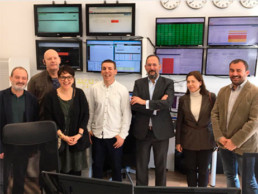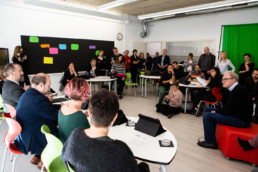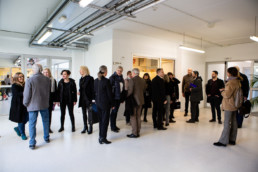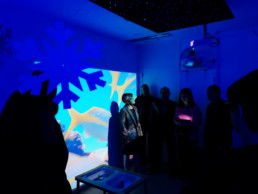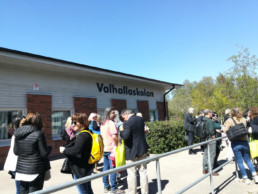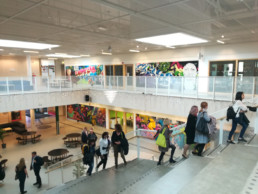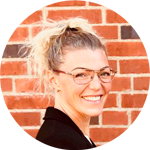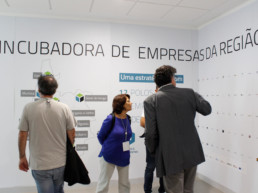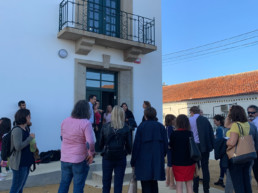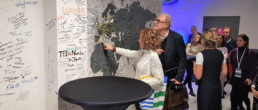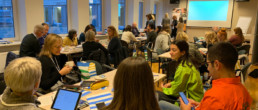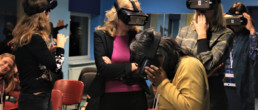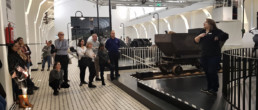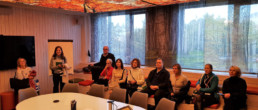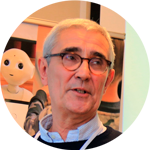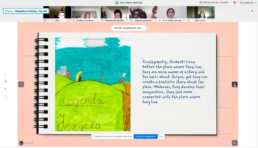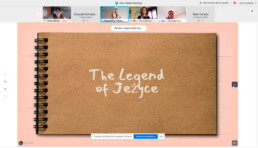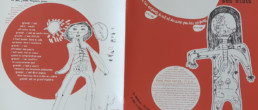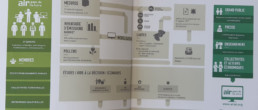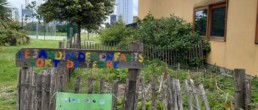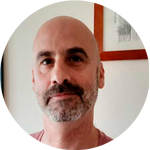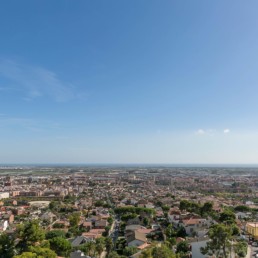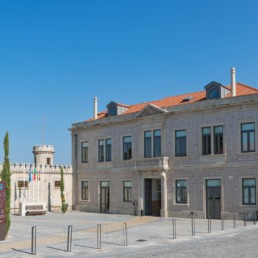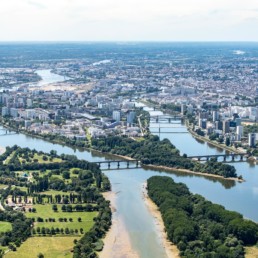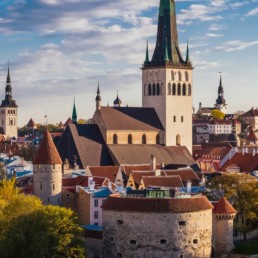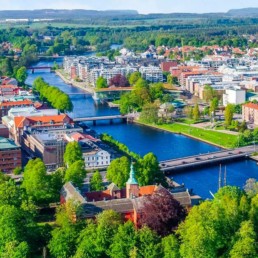ON BOARD´s original method for the transfer process consisted of six Exchange and Learning Transnational Meetings -one in each Partner city- with a Network Final Event showcasing the results, including insights and new opportunities, and highlighting the learning and achievements. When COVID 19 erupted in March 2020 and took over everyone’s normal lives, ON BOARD and its stakeholders adjusted methods and went to work online, where Partners’ close interactions continued.
In each of the international gatherings, the ON BOARD cities dealt with a different transfer step to help build an integrated Educational Innovation Network structure, such as governance issues and the communication system based on Viladecans’ Good Practice. To motivate local education agents, start building local Educational Innovation Networks and show first results, all cities, including Viladecans, engaged and activated their local educational communities in a “learn by doing” approach for implementing Pilot Education Projects that, in turn, resulted in enhancing the Good Practice with new international perspectives and practices.
First, mirroring Viladecans’ Good Practice, each Partner city set up its own local group of stakeholders, the URBACT Local Groups. These are educational agents who provided the necessary energy for the Educational Network to take root and grow. These local, broad-based groups included teachers, school managers, students, local businesses, universities, non-formal education groups and clubs, and parents. Leading the transfer process in their cities, they eventually became the Educational Innovation Network founding members.
Then, at each Transnational Meeting the Partnership focused on one different Educational Innovation Network stakeholder at a time. Representatives of these stakeholders were invited to attend each meeting, where they benefited from the peer exchanges and new learning with participants from other Partner cities. The international meetings also included visits to schools and other community institutions with a relevant role in education innovation, thus enabling ON BOARD Partners and representatives to meet the people involved and get to know more about their collaborations and experiences.
In addition, ON BOARD invited local and international experts addressed education topics at each of these international meetings, giving Partners and their cohorts chances to learn more about thematic educational innovation topics that could inspire and motivate their own local work.
Throughout all, the Lead Partner Viladecans, with the support of the URBACT expert team, drove the process of the Good Practice Transfer, ensuring that the learning and exchanges were captured in each Partner city through their URBACT Local Groups and collected for use by wider European audiences interested in starting, or strengthening, their own education innovation actions. Upon return of the international gathering, all Project Partners met with their local agents to discuss, adjust and plan for the transferring.
TransferSteps
- Step 1Viladecans
- The political committment and integrated approach
- Elected authorities
- Step 2Halmstad
- The Structure and Governance of the Educational Innovation Network and Pilot Projects
- Teachers and Headmasters
- Step 3Albergaria
- The communication supporting the Educational Innovation Network
- Businesses and Universities
- Step 4Tallinn
- Midway reflections to strengthen the transfer process
- Local Entities
- Step 5Poznań
- Sustaining the Educational Innovation Network
- Students and Families
- Step 6Nantes
- Education 360º and 21st Century Trend
- The Education Community
Step 1 - Transnational Meeting 1 - Viladecans
The first Transnational Meeting took place in Viladecans (February 2019) to set the basis for the Educational Innovation Network, share the Partners’ vision vis-a-vis the Good Practice, and exchange views about the ambitious expected results of the transfer process.
Despite the fact that policy competences at the municipal level are sometimes limited, ON BOARD cities nevertheless set out to prove that the city can make a difference in the educational results of children and youths in the city when the political will is strong and can develop a clear vision of a city-wide integrated education policy that mobilises diverse local stakeholders and local and external resources.
Indeed, local authorities are best positioned to draw near their city’s teaching and non-teaching education agents to understand their needs and capacities and, together with them, generate collaborative initiatives that put everyone’ experience at the service of a more future-oriented education.
Municipalities also deepened awareness that they can find other allies from higher levels of government -regional, national and European- if they manage to open dialogues and can align local educational innovation projects with these higher-level priorities as part of an integrated vertical government strategy.
Mainstakeholder
Local Authorities and the Educational Innovation Networks
ON BOARD project invited all local public authorities from each Partner City to participate in the Kick-Off Meeting in Viladecans. Here, they all agreed and signed a joint Declaration expressing their commitment to support the Educational Innovation project.
On site visit
During the Transnational Meeting 1 the ON BOARD partners visited some education projects in the city
Projects
- Miquel Martí i Pol primary school
- Smart classroom
- New learning environments
- Parents’ Association
- Musical collaboration between primary and secondary students
- Local companies co-mentoring upper secondary students
- La Pineda municipal nursery school
- Robotics project
- Arts makers project
Inspiring voices
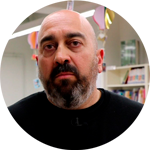
Guillermo Bautista
Ph.D. Professor-Researcher at the Department of Education and eLearning Centre - Open University of Catalonia, and Programme Director of the Masters’ Degree for Teacher Training in Primary, Secondary, Vocational Training and Languages.
Bautista introduced the trends influencing todays’ education model and presented the Smart Classroom Project being implemented in Viladecans in collaboration with the Open University of Catalonia.
STEP 2 - Transnational Meeting 2 - Halmstad
At Transnational Meeting 2, in Halmstad (Sweden, May 2019), all cities analysed the structure and functions of the Educational Innovation Network as it exists in Viladecans, focussing on its leading institutions and the roles and tasks of its coordination team and members. Creating an Educational Innovation Network, like the one in Viladecans, entails adapting it to each city’s own context considering: governance, scale, and human and financial resources.
Because the Educational Innovation Network has clear parallelisms with Communities of Practice for engaging and activating interested stakeholders, a closer look into this practice helped frame new understandings about the formation, activation, and different purposes of work inside an Educational Innovation Network.
The Virtuous Circle of Communities of Practice
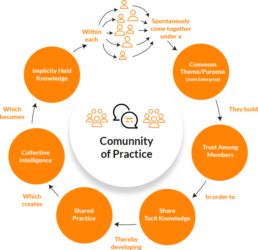
In Halmstad, all Transfer Cities drafted a first design of their local Educational Innovation Network which they brought back to their respective cities to discuss and further develop together with their URBACT local group members to adjust to their own needs and capacities.
ON BOARD cities also shared their respective Educational Innovation Projects with other partners. In an open gallery session, each Partner brought information kits showcasing innovative projects being implemented in their primary and secondary schools so that other ON BOARD cities could discuss, ask questions and choose those that best suited themselves for own adaptation and implementation.
Out of this session, the project partners developed their own ON BOARD Basket of Eduprojects, a set of innovative and multistakeholder projects that other Partners could uptake and adjust to their own context as Pilot Projects. These was the first move towards building their local Educational Innovation Networks, employing a very practical, learn-by-doing approach.
Our Halmstad team and its local group of stakeholders presented the Learning Communities initiative, which is based on the concept of two-way learning and follows an action research-based method for aligning school curriculum with students’ interests and teacher-guided observation.
Mainstakeholder
Headmasters and teachers as education innovators
Education Innovation needs the commitment of schools’ headmasters and teachers who become the first true innovators. They are committed, dare to risk and, as leaders, they inspire others to think “out-of-the box” and contribute their best.
Outputs
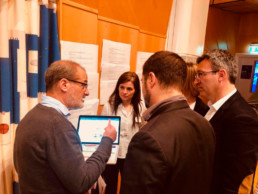
Halmstad’s meeting resulted in the first actions towards Pilot Project planning, design of Partners’ Educational Innovation Network and resources mobilisation.
On site visit
During the Transnational Meeting 2 the ON BOARD partners visited some education projects in the city
ON BOARD partners were also presented the Real Classroom Lab (RCL) project at Valhalla; Digitizing STEM education at the visit to Söndrumsskolan higher primary school; the Brain Gym at the Kattegattgymnasiet Upper Secondary school; and, the Digital Laboratory Center (DLC), at the University of Halmstad, which is a creative, high-tech laboratory environment focusing on learning, culture and creativity – an important part of the university’s work with digitalisation in education and research)
Inspiring voices
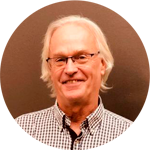
Paul Fenton
Senior Project Manager at Universitat Oberta de Catalunya and URBACT Ad Hoc Expert
Paul Fenton offered an overview of the relevance and applicability for a Community of Practice approach as a way to guide the respective local Educational Innovation Networks in the ON BOARD partner cities.
STEP 3 - Transnational Meeting 3 – Albergaria-a-Velha
At Transnational Meeting 3, in Albergaria, ON BOARD Partners tackled what would be necessary to set up a well-defined, structured and managed communication strategy that could allow each Partner to reach out to different audiences in the education community. Not only to explain the project results, but also to facilitate supporting the close-knit network of relations among a diversity of education agents in the city who, otherwise, might not have a common “space” for sharing and exchanging as a group. Viladecans led the way, setting forth the Communication Strategy of the Educational Innovation Network based on its own experience: the structure, functions and required resources needed.
Another key subject in Albergaria was involving local businesses and the Higher Education entities in the Education Innovation Network. Here, ON BOARD could appreciate the close partnership between Aveiro University and the Municipality of Albergaria-a-Velha, as an example of cooperation and projects to improve Education, including the planning of the local Education Strategy and supporting local start-ups with training for young entrepreneurs.
Representatives from local companies joined ON BOARD’S meeting to debate with members from education centres and the university about how to encourage experiential learning (learning by doing) in collaboration for education innovation.
Albergaria URBACT Local Group presented the Market of Local Innovation Projects, where Partners and participants from each ON BOARD city could visit different projects close up and talk with the leaders on these initiatives, which ranged from robotics, entrepreneurship skills projects, to the mentoring of students, and more.
Mainstakeholder
Business and Universities: how can they get involved
The involvement of a university and the local business sector in education can be shaped in different forms of engagement. These interactions lead to benefits at different levels: more meaningful learning for youths to prepare them for the real world; skills-building amongst teachers; greater alignments between work force demands and the city’s population skills, among others.
Outputs
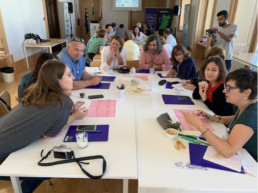
Meeting session with members of the business, knowledge and education sectors to discover opportunities for collaboration.
In Albergaria, intensive work and discussion resulted into new project proposals involving local companies and universities in joint projects with schools that partners could implement back home
On site visit
During the Transnational Meeting 3 the ON BOARD partners visited some education projects in the city
- Business Incubator and Training Services Centre
- Avenida School Smart Classroom
- Snoezelen Class, a Sensory Integration Room for young with physical or neurological disabilities.
Inspiring voices
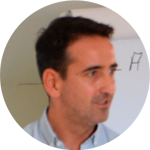
Ricardo Pinhão
Partner and CEO Soul4Biz and Master Practitioner at International Training Academy of NLP
Ricardo Pinhão led the group of ON BOARD participants in Albergaria through a session that made them realise of the different learning styles, linking behaviours to colours and as a way to understand and separate the person from its behaviour.
STEP 4 - Transnational Meeting 4 - Tallinn
At Transnational Meeting 4, in Tallinn, ON BOARD Partners were shown the Estonian Digital Strategy, one of Europe’s most advanced digitalised education systems, in line with the national Digital Strategy.
The Partners explored the potential that non-formal education entities and institutions have in strengthening the local education community and contribute to capacities of children and youths. On this, and as part of ON BOARD’s transfer method, the project Partners invited representatives from their own local entities to share each other’s experiences.
From all partner cities came representatives of their respective local entities, including non-formal education organisations, NGOs, Youth Associations, Music Conservatory, popular culture groups, members form Makerspaces, Cultural entities, and science and robotics training organisations.
Tallinn presented its model of public–private partnership between formal and non-formal education centres with practical sessions of the activities and projects that contribute to education of children aged 5 on, namely Kullo Hobby Centre (Tallinn school for extra-curricular activities) and the Haabersti Noortekeskus Youth Centre.
It was also the time for an assessment of the ON BOARD Network transfer progress for all Partners, including Viladecans, against initial Transfer and Improvement Plans. Partners shared unexpected difficulties and reviewed such matters as management, human and financial resources, and the cross-cutting approaches for engaging different actors in the community. Adjustments and back-up plans were set up.
Mainstakeholder
Local entities for wider education opportunities
For ON BOARD partners, local entities are those agents that intentionally or unintentionally contribute to educating children and young and have an influence at different education moments of their lives: youth and sports clubs, after-school organisations, leisure entities, environmental and cultural institutions -museum, arts, libraries…-, volunteer organisations, cooperatives and social enterprises, civic and community organisations (neighbourhood, elderly…), training and skills-development associations, etc.
ON BOARD Partners took a deep dive into Tallinn’s own experience with its youth organisations, which deliver important leisure, sports and cultural activities for students in their after-school time.
Outputs
The Mid Term Review session and debate led to a deep assessment of the transfer progress in each of the partner cities and as a Network project.
On site visit
During the Transnational Meeting 4 the ON BOARD partners visited some education projects in the city
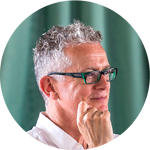
Eddy Adams
URBACT Programme Expert and UIA expert
Addams presented the Rotterdam BRIDGE Urban Innovative Action, a project that addresses the urgent urban challenge of better aligning young people’s educational choices with future labour market needs in South Rotterdam, a deprived area with high rates of immigration and youth unemployment.
STEP 5 - Transnational Meeting 5 - Poznań
The Transnational Meeting 5, slated to be held in Poznań got upended due to the COVID-19 outbreak. Instead of face-to-face, ON BOARD Lead Partner organized it as an online event with Partners, which took place over parts of three days.
On the one hand, ON BOARD looked at how to achieve more students’ empowerment over their own learning processes; and what ways are more effective at getting families more closely involved in the education processes of their children, including getting their participation in school projects.
On the other hand, since ON BOARD was entering its last stage of the transfer journey, the focus turned to the Educational Innovation Network’s sustainability factors in each city. Here, discussed was:
- The need for Partners to develop a well-defined fundraising strategy and a financial plan to foresee diverse sources of funding (local, regional national and EU).
- The hard and soft-type of sustainability factors, corresponding to structural and resource-related aspects, the first, and to the actions towards boosting motivation and engagement while building a sense belonging to the education community, the second.
Poznań presented two Educational Innovation Network Pilot Projects which have involved 3 schools in the District of Jeżyce, where the Educational Innovation Network Good Practice is being transferred: My Story of Jeżyce and The Legend of Jeżyce
Mainstakeholder
Students’ empowerment & family engagement for better educational success
At the basis of the students’ education success is motivation. All ON BOARD partners know that the student’s direct involvement in education decisions and projects spurs their interest and motivation.
Parents’ participation in schools’ projects and activities has proved to create collaborative bonds that contribute to strengthening and prestige the centre and its teachers, and to develop a sense of pride and belonging.
Outputs
During the period previous to the TM5, all ON BOARD partners had dedicated significant work to develop their respective Transfer Stories, summarising and compiling in an article the transfer experience of the previous months. All Stories can be found in the URBACT ON BOARD site.
On site visit
During the Transnational Meeting 5 the ON BOARD partners visited some education projects in the city
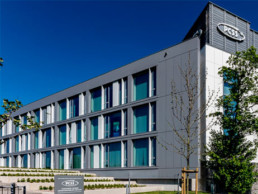
Poznań Supercomputing and Networking Centre (PSNC).
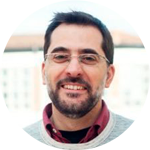
Jordi Collet
PhD. Sociology of Education, at the University of Vic (Barcelona)
To highlight the important role families can play in education, Jordi Collet, PhD. Sociology of Education, at the University of Vic (Barcelona) gave a talk about current trends, difficulties and a scope of potential work to facilitate families to become active members in education.
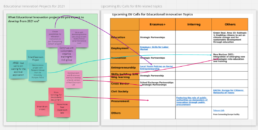
With a view towards sustainability, ON BOARD Ad Hoc Expert, Paul Fenton, gave a virtual presentation on EU programs and funding instruments that support education projects, including some tips and recommendations regards building the capacity and getting the resources required to compete for these funding opportunities.
STEP 6 - Transfer Meeting 6 - Nantes
Transfer Meeting 6 was the last ON BOARD gathering dedicated to the transfer of the Educational Innovation Network. In the previous Network Events, all Partner Cities had focused on different transfer steps towards building the local Education Network taking Viladecans case as the reference.
In this virtual international gathering hosted by the city of Nantes, the meeting was approached as a recap exercise and expert insights on Educational Innovation topics. All partners explored the concept of Education as a 360º vision, with the idea that the city is where education happens, everywhere and at any time, and all citizens potentially have education capacities. In addition, two topics: open source tools for teachers and students, and 21st Century skills, completed the seminar.
All meeting participants attended the presentation of Nantes education projects, implemented as part of the Educational Innovation Network transfer process. After watching the videos prepared by Nantes local stakeholders from the participant primary and secondary schools, all ON BOARD partners gave feedback, with views and comments for potential improvement.
Outputs
ON BOARD Partners presented their first drafted Transfer Learning Logs, the main reporting and communication tool showing their achievements all along the URBACT ON BOARD Transfer Journey.
Viladecans | Poznań | Albergaria | Halmstad | Nantes | Tallinn
On site visit
During the Transnational Meeting 6 the ON BOARD partners visited some education projects in the city
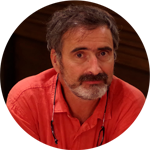
Colin de la Higuera
UNESCO Chair in Technologies for the Training of Teachers by Open Educational Resources at University of Nantes (France)
Colin de la Higuera gave a talk on the value of Open Education Resources and practices and how a city’s Educational Innovation Network can make the best use of these.
See whatON BOARD partner citieshave achieved
Diversity bolstered ON BOARD’s learning and exchange project. They all represent a diversity of focuses and interests in education, but they also have in common Education as a strategic development priority for their cities
The content of the Website reflects only the authors view. The Managing Authority and the European Comission are not liable for any use that may be made of the information it contains.
